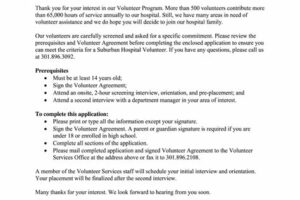Table of Contents
Looking to make a difference in people’s lives? Volunteer at a hospital and contribute to the well-being of patients and their families. Gain valuable experience, develop new skills, and make lasting connections in the healthcare industry. Join our team of dedicated volunteers and bring positivity and compassion to those in need.
Are you passionate about making a difference in the lives of others? Do you have a desire to contribute to your community and gain invaluable experiences along the way? If so, volunteering at a hospital might be the perfect opportunity for you. Not only will you have the chance to lend a helping hand to those in need, but you will also be exposed to the fast-paced environment of healthcare, where every day brings new challenges and rewards. Whether you aspire to pursue a career in medicine or simply want to give back, volunteering at a hospital can provide a fulfilling and enriching experience that will leave a lasting impact on both you and the patients you serve.
Why Volunteer at a Hospital?
Volunteering at a hospital can be a rewarding and fulfilling experience. It provides an opportunity to make a positive impact on the lives of patients, their families, and the healthcare professionals who work tirelessly to provide care. Whether you are considering a career in healthcare or simply want to give back to your community, volunteering at a hospital can be a valuable and meaningful way to contribute.
Supporting Patients
One of the primary roles of hospital volunteers is to provide support to patients. This may involve offering a friendly smile, lending a listening ear, or engaging in conversations to alleviate feelings of loneliness or anxiety. Volunteers can also assist with non-medical tasks such as delivering flowers, running errands, or providing companionship during meal times. These small gestures can greatly enhance the well-being and comfort of patients during their hospital stay.
Assisting Healthcare Professionals
Hospital volunteers play a crucial role in supporting healthcare professionals. They can help with administrative tasks, such as filing paperwork or organizing medical records, allowing doctors and nurses to focus more on patient care. Volunteers may also provide assistance during procedures or treatments, ensuring that necessary equipment and supplies are readily available. By lightening the workload of healthcare professionals, volunteers contribute to the efficient functioning of the hospital.
Exploring Healthcare Careers
If you have an interest in pursuing a career in healthcare, volunteering at a hospital can offer valuable insights and experiences. It provides an opportunity to observe various healthcare professions in action, including doctors, nurses, therapists, and technicians. By interacting with these professionals and witnessing their daily responsibilities, you can gain a better understanding of different roles and specialties within the healthcare field. This firsthand exposure can help you make more informed decisions about your future career path.
Building Interpersonal Skills
Volunteering at a hospital requires strong interpersonal skills. It offers a chance to interact with individuals from diverse backgrounds and cultures, improving your ability to communicate and connect with people from all walks of life. Through daily interactions with patients, their families, and healthcare professionals, you can develop empathy, patience, and understanding. These interpersonal skills are invaluable in any professional or personal setting and can greatly enhance your overall growth and development.
Contributing to Research and Education
Hospitals often conduct research studies and educational programs to advance medical knowledge and improve patient care. Volunteers can play a crucial role in supporting these initiatives by assisting with data collection, organizing educational materials, or participating in awareness campaigns. By contributing to research and education, volunteers not only help advance medical science but also contribute to the dissemination of valuable health information within the community.
Broadening Perspectives
Volunteering at a hospital exposes you to a wide range of medical conditions and situations. This exposure can broaden your perspective on healthcare, highlighting the challenges faced by patients and the resilience demonstrated by healthcare professionals. It can also increase your awareness of public health issues and the importance of preventive care. By witnessing firsthand the impact of healthcare on individuals and communities, you can develop a deeper appreciation for the significance of accessible and quality healthcare services.
Creating a Positive Impact
Volunteering at a hospital allows you to make a positive impact on the lives of others. Whether it is bringing a smile to a patient’s face, providing comfort during difficult times, or assisting with vital tasks, your presence as a volunteer can bring hope and reassurance to those in need. Knowing that you have made a difference in someone’s life, no matter how small, can be incredibly fulfilling and motivating.
Developing Teamwork and Leadership Skills
Hospital volunteering often involves collaboration with other volunteers and healthcare professionals. This teamwork fosters the development of essential skills such as communication, cooperation, and problem-solving. Additionally, taking on responsibilities within the volunteer program, such as coordinating schedules or training new volunteers, can provide valuable leadership experiences. These skills are transferable to various professional settings and can enhance your overall employability.
Gaining Personal Fulfillment
Above all, volunteering at a hospital offers a sense of personal fulfillment. Knowing that you have contributed to the well-being of others and supported the healthcare system can bring a profound sense of satisfaction and purpose. Volunteering can also provide a welcome break from our own daily routines, allowing us to gain perspective and appreciate the blessings we have. The gratitude and appreciation expressed by patients, families, and healthcare professionals further reinforce the value of your efforts.
Conclusion
Volunteering at a hospital is an opportunity to give back, support patients, assist healthcare professionals, and gain valuable experiences. The impact you can make, both on an individual level and on the healthcare system as a whole, is immeasurable. Whether you are considering a future career in healthcare or simply want to make a difference in the lives of others, volunteering at a hospital is a noble and rewarding endeavor.
The Importance of Volunteering at Hospitals
Volunteering at hospitals plays a crucial role in providing support, comfort, and assistance to patients and their families during challenging times. These remarkable individuals selflessly dedicate their time and skills to assist healthcare professionals, offering a helping hand and a friendly face when it is needed most. Their invaluable contributions make a significant difference in enhancing the quality of care and overall experience for patients within these healthcare settings.
Exploring Various Volunteer Roles at Hospitals
Hospitals offer a diverse range of volunteer positions that cater to different interests and skill sets. From working as receptionists or patient advocates to assisting with administrative tasks or accompanying patients during medical procedures, these volunteer opportunities allow individuals to actively engage in hospital operations and make a positive impact on the lives of others.
Building Empathy and Compassion through Hospital Volunteering
Volunteering at hospitals offers a unique opportunity for individuals to develop empathy and compassion, essential qualities for any aspiring journalist. By interacting with patients and their families, volunteers gain a deeper understanding of the human experience, fostering their ability to connect with diverse individuals and tell their stories with sensitivity and understanding.
Enhancing Communication and Interpersonal Skills
Effective communication is a fundamental aspect of journalism, and hospital volunteering allows individuals to refine their communication and interpersonal skills in a real-world setting. Working with a diverse group of people, including healthcare professionals, patients, and fellow volunteers, volunteers learn how to adapt their communication styles, listen actively, and convey information accurately, all of which are vital skills for successful journalists.
Witnessing Resilience and Strength in the Face of Adversity
Journalists often encounter challenging situations, requiring resilience and mental fortitude. Volunteering at hospitals exposes individuals to stories of resilience and strength in the face of adversity, providing firsthand experiences and perspectives that can shape their journalistic approach. Documenting the triumphs and struggles of patients and healthcare professionals informs a journalist’s ability to amplify these stories with authenticity and sensitivity.
Understanding Healthcare Systems and Policies
Volunteering at hospitals offers a unique opportunity to gain insight into healthcare systems and policies, which are crucial topics for journalists covering health-related issues. Volunteers become familiar with various aspects of healthcare administration, such as patient privacy regulations, insurance billing processes, and resource allocation, equipping budding journalists with a comprehensive understanding of the complexities inherent in healthcare reporting.
Connecting with a Diverse Community and Cultivating Cultural Competence
Journalists strive to represent diverse communities accurately, and volunteering at hospitals exposes individuals to a diverse range of patients from different backgrounds and cultures. Engaging with patients from various ethnicities, religions, and socio-economic backgrounds enhances cultural competence and fosters a broader understanding of the challenges faced by marginalized communities. This experience equips journalists with the skills needed to cover stories with cultural sensitivity and inclusivity.
The Personal Growth and Fulfillment of Hospital Volunteering
Volunteering at hospitals not only benefits the community but also promotes personal growth and fulfillment. By selflessly contributing their time and energy, volunteers experience a sense of purpose and satisfaction, knowing they are making a positive impact on the lives of others. This fulfillment can be transformative, instilling a lifelong commitment to service and inspiring journalists to use their platform for social change and advocacy.
In today’s society, where hectic schedules and self-centered lifestyles have become the norm, there are still those who choose to dedicate their time and energy to making a difference in the lives of others. These individuals, known as volunteers, selflessly offer their services in various organizations and institutions, with one common goal: to bring hope and support to those in need. One such place where these heroes can be found is the hospital.
1. A Helping Hand:
Volunteering at a hospital is like extending a helping hand to those who are fighting battles beyond their control. From patients battling serious illnesses to their worried families, volunteers provide a glimmer of hope and comfort in times of distress. By assisting with tasks such as running errands, delivering meals, or simply offering a listening ear, volunteers play a vital role in easing the burden on hospital staff and creating a positive environment for all.
2. Emotional Support:
When faced with health challenges, individuals often experience a whirlwind of emotions ranging from fear and anxiety to sadness and frustration. Volunteers at hospitals are trained to provide emotional support to both patients and their loved ones. They offer a compassionate presence, lending a sympathetic ear and a shoulder to lean on during difficult times. Their ability to empathize and connect with those in distress helps foster a sense of community within the hospital walls.
3. Enhancing Patient Experience:
Volunteers are instrumental in enhancing the overall patient experience within hospitals. Whether through organizing recreational activities, reading books aloud, or engaging in friendly conversations, volunteers bring a ray of sunshine into the often gloomy hospital environment. Their efforts not only alleviate boredom but also promote social interaction and mental well-being among patients, ultimately contributing to a faster recovery process.
4. Bridging the Gap:
Hospitals can be intimidating and overwhelming places, especially for those who are unfamiliar with medical procedures or terminology. Volunteers act as a bridge between patients and medical staff, helping to explain procedures, answering questions, and offering guidance. By breaking down barriers and creating a more approachable atmosphere, volunteers ensure that patients feel supported and well-informed throughout their hospital journey.
5. Learning and Growth:
Volunteering at a hospital is not only an opportunity to give back but also a chance for personal growth and learning. Volunteers gain valuable insights into the healthcare industry, witnessing firsthand the dedication and resilience of medical professionals. They develop essential skills such as empathy, patience, and adaptability, which can be applied to various aspects of life. Additionally, volunteering at a hospital allows individuals to appreciate the blessings of good health and instills a sense of gratitude for their own well-being.
In conclusion, volunteers play a crucial role in hospitals, offering their time and skills to support patients and their families. Through their selflessness and dedication, they bring hope, comfort, and a sense of community to those in need. Volunteering at a hospital is not only an act of kindness but also an opportunity for personal growth and learning. These unsung heroes deserve recognition for their invaluable contributions in making our hospitals a better place.
Dear valued readers,
As our journey through the world of volunteering at hospitals comes to a close, we hope that you have found inspiration, insight, and a newfound appreciation for the incredible work done by these unsung heroes. Throughout this series, we have shed light on the various aspects of volunteering at hospitals, from the personal growth it offers to the impact it has on patients and their families. Now, as we bid farewell, we invite you to reflect on the potential of becoming a hospital volunteer and the positive change it can bring to your life.
Firstly, volunteering at a hospital provides an invaluable opportunity for personal development. The experience gained in a medical setting can be both professionally and emotionally enriching. Whether you aspire to pursue a career in healthcare or simply want to give back to your community, becoming a hospital volunteer allows you to gain hands-on experience and insight into the medical field. From interacting with patients and their families to observing medical professionals in action, you will witness firsthand the dedication, compassion, and resilience required in the healthcare industry. This exposure not only enhances your empathy and communication skills but can also serve as a stepping stone towards your future endeavors.
Furthermore, the impact of volunteering at hospitals extends far beyond personal growth. By offering your time and support, you become an integral part of a team that strives to make a difference in the lives of those in need. Every smile you bring to a patient’s face, every conversation you share with a worried family member, and every small act of kindness you offer can have a profound effect on their well-being. Your presence alone can bring comfort and reassurance to individuals who may be going through some of the most difficult times in their lives. By volunteering at a hospital, you have the power to bring hope, strength, and positivity to those who need it most.
In conclusion, the experience of volunteering at a hospital is one that cannot be measured solely by the number of hours spent or tasks completed. It is a journey that encompasses personal growth, empathy, and the ability to make a positive impact on the lives of others. We hope that this series has inspired you to consider becoming a hospital volunteer and has provided you with the necessary information to take that first step. Remember, even the smallest act of kindness can leave an everlasting mark on someone’s life. So, why not embark on this fulfilling adventure and join the ranks of those who dedicate their time to making a difference? Together, we can create a world where compassion and care prevail.
Thank you for joining us on this exploration of volunteering at hospitals, and we look forward to seeing you again soon.
Video Volunteer At Hospital
1. What are the benefits of volunteering at a hospital?
Volunteering at a hospital offers numerous benefits both to the individuals volunteering and to the community as a whole. Some key benefits include:
- Personal satisfaction: Volunteering allows you to make a positive impact on the lives of others, providing a sense of fulfillment and purpose.
- Experience and skill development: By volunteering at a hospital, you can gain valuable experience in the healthcare field, develop essential skills such as empathy and communication, and explore potential career paths.
- Networking opportunities: Volunteering enables you to connect with healthcare professionals, potentially opening doors for future employment or educational opportunities.
- Community involvement: By dedicating your time and skills to a hospital, you contribute to the well-being of your local community and help ensure that quality healthcare services are accessible to all.
2. How can I become a volunteer at a hospital?
Becoming a volunteer at a hospital typically involves the following steps:
- Research hospitals: Identify hospitals in your area that accept volunteers and align with your interests and goals.
- Contact the hospital: Reach out to the hospital’s volunteer services department or coordinator to inquire about volunteer opportunities and the application process.
- Complete an application: Fill out the required application form, providing necessary personal information and indicating your availability, skills, and interests.
- Interview and orientation: Attend an interview where you may discuss your motivations for volunteering and undergo a background check. If selected, you will receive orientation and training specific to your role as a hospital volunteer.
- Start volunteering: Once you have completed the necessary steps, you can begin your volunteer work at the hospital and make a meaningful contribution to the healthcare team.
3. What tasks do hospital volunteers typically perform?
Hospital volunteers play a vital role in supporting healthcare professionals and enhancing the patient experience. While specific tasks may vary depending on the hospital’s needs and volunteer programs, common responsibilities include:
- Greeting and assisting patients and visitors
- Providing comfort and companionship to patients
- Assisting with administrative tasks, such as filing and data entry
- Delivering items within the hospital, such as lab specimens or documents
- Supporting staff in non-medical activities, such as organizing events or fundraisers
- Helping to maintain a clean and welcoming environment for patients and visitors
4. Are there any specific requirements to volunteer at a hospital?
Each hospital may have its own requirements for volunteers, but some common prerequisites include:
- Minimum age: Hospitals often require volunteers to be at least 16 or 18 years old, although some may have programs for younger individuals.
- Health screenings: Volunteers may need to undergo health screenings, including immunizations, to ensure the safety of patients and themselves.
- Background check: Hospitals typically conduct background checks to ensure the security and well-being of patients and staff.
- Training and orientation: Volunteers are usually required to attend orientation sessions and complete any necessary training specific to their roles.
- Time commitment: Hospitals may ask for a certain number of hours per week or month, depending on their needs and the volunteer’s availability.
Remember to consult with your chosen hospital regarding their specific requirements and guidelines for volunteering.






